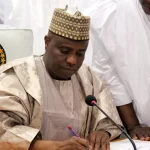President of the European Commission, Ursula von der Leyen, has unveiled her proposed new team of commissioners following negotiations with EU member states.
The European Commission is the EU’s equivalent of a cabinet, with each commissioner in charge of a separate portfolio.
Ten of the 26 proposed commissioners are women, while the other sixteen are men.
When she was elected European Commission president for a second five-year term in July, Ms von der Leyen asked member countries to put forward two names, a man and a woman, as candidates.
Speaking to reporters in Strasbourg on Tuesday morning, the Commission chief described her newly unveiled college of Commissioners as having a “leaner” and more “interactive and inter-linked structure,” centred on the core principles of “prosperity, security and democracy.”
The Commission chief has appointed six executive vice-presidents (EVPs) – four women and two men – who will be given greater leverage over the executive’s business and oversee the work of a cluster of Commissioners.
They include Spain’s Teresa Ribera, France’s Stéphane Séjourné as well as Italy’s Raffaele Fitto, despite the European socialists recently warning von der Leyen against handing over a vice-presidency to the hard-right pick of Italy’s Giorgia Meloni.
The three remaining EVP positions have been handed to Estonia’s former prime minister Kaja Kallas, nominated to be the bloc’s top diplomat by EU leaders back in June, as well as Romania’s Roxana Mînzatu and Finland’s Henna Virkkunen.
Europe’s waning competitiveness vis-à-vis global powers such as the US and China is the red thread that ties the executive vice-presidencies together.
The roster of portfolios also includes newly-created roles including a European Commissioner for defence and security (Lithuania’s former prime minister Andrius Kubilius), the Mediterranean (Croatia’s Dubravka Šuica) and housing and energy (Denmark’s Dan Jørgensen).
Here’s how the Commission chief divvied up her policy portfolios:
VDL’s proposed college of European Commissioners
Austria – Magnus Brunner – Commissioner for Internal Affairs and Migration
Belgium – Hadja Lahbib – Commissioner for Preparedness and Crisis Management
Bulgaria – Ekaterina Zaharieva – Commissioner for Startups, Research and Innovation
Croatia – Dubravka Šuica – Commissioner for the Mediterranean
Cyprus – Costas Kadis – Commissioner for Fisheries and Oceans
Czech Republic – Jozef Sikela – Commissioner for the International Partnerships
Denmark – Dan Jørgensen – Commissioner for Energy and Housing
Estonia – Kaja Kallas – Executive Vice-President for Foreign and Security Policy and High Representative for Foreign Affairs and Defence Policy
Finland – Henna Virkkunen – Executive Vice-President for Tech Sovereignty, Security and Democracy, Commissioner for Digital and Frontier Technologies
France – Stéphane Séjourné – Executive Vice-President for Prosperity and Industrial Strategy, Commissioner for Industry, SMEs and the Single Market
Germany – Ursula von der Leyen – European Commission President
Greece – Apostolos Tzitzikostas – Commissioner for Sustainable Transport and Tourism
Hungary – Olivér Várhelyi – Commissioner for Health and Animal Welfare
Ireland – Michael McGrath- Commissioner for Democracy, Justice and the Rule of Law
Italy – Raffaele Fitto – Executive Vice-President for Cohesion and Reforms, Commissioner for Cohesion Policy, Regional Development and Cities
Latvia – Valdis Dombrovskis – Commissioner for Economy and Productivity; Implementation and Simplification
Lithuania – Andrius Kubilius – Commissioner for Defence and Space
Luxembourg – Christophe Hansen – Commissioner for Agriculture and Food
Malta – Glenn Micallef – Commissioner for Intergenerational Fairness, Culture, Youth and Sport.
Netherlands – Wopke Hoekstra – Commissioner for Climate, Net-Zero and Clean Growth, also responsible for taxation
Poland – Piotr Serafin – Commissioner for Budget, Anti-Fraud and Public Administration
Portugal – Maria Luis Alburquerque – Commissioner for Financial Services and the Savings and Investment Union
Romania – Roxana Mînzatu – Executive Vice-President for People, Skills and Preparedness, Commissioner for Skills, Education, Quality Jobs and Social Rights
Slovakia – Maroš Šefčovič – Commissioner for Trade and Economic Security; Interinstitutional Relations and Transparency
Slovenia – Marta Kos – Commissioner for Enlargement, also responsible for the eastern neighbourhood and Ukraine’s reconstruction
Spain – Teresa Ribera – Executive Vice-President for Clean, Just and Competitive Transition, Commissioner for Competition
Sweden – Jessika Roswall – Commissioner for Environment, Water Resilience and a Competitive Circular Economy
President of the European Commission, Ursula von der Leyen, has unveiled her proposed new team of commissioners following negotiations with EU member states.
The European Commission is the EU’s equivalent of a cabinet, with each commissioner in charge of a separate portfolio.
Ten of the 26 proposed commissioners are women, while the other sixteen are men.
When she was elected European Commission president for a second five-year term in July, Ms von der Leyen asked member countries to put forward two names, a man and a woman, as candidates.
Speaking to reporters in Strasbourg on Tuesday morning, the Commission chief described her newly unveiled college of Commissioners as having a “leaner” and more “interactive and inter-linked structure,” centred on the core principles of “prosperity, security and democracy.”
The Commission chief has appointed six executive vice-presidents (EVPs) – four women and two men – who will be given greater leverage over the executive’s business and oversee the work of a cluster of Commissioners.
They include Spain’s Teresa Ribera, France’s Stéphane Séjourné as well as Italy’s Raffaele Fitto, despite the European socialists recently warning von der Leyen against handing over a vice-presidency to the hard-right pick of Italy’s Giorgia Meloni.
The three remaining EVP positions have been handed to Estonia’s former prime minister Kaja Kallas, nominated to be the bloc’s top diplomat by EU leaders back in June, as well as Romania’s Roxana Mînzatu and Finland’s Henna Virkkunen.
Europe’s waning competitiveness vis-à-vis global powers such as the US and China is the red thread that ties the executive vice-presidencies together.
The roster of portfolios also includes newly-created roles including a European Commissioner for defence and security (Lithuania’s former prime minister Andrius Kubilius), the Mediterranean (Croatia’s Dubravka Šuica) and housing and energy (Denmark’s Dan Jørgensen).
Here’s how the Commission chief divvied up her policy portfolios:
VDL’s proposed college of European Commissioners
Austria – Magnus Brunner – Commissioner for Internal Affairs and Migration
Belgium – Hadja Lahbib – Commissioner for Preparedness and Crisis Management
Bulgaria – Ekaterina Zaharieva – Commissioner for Startups, Research and Innovation
Croatia – Dubravka Šuica – Commissioner for the Mediterranean
Cyprus – Costas Kadis – Commissioner for Fisheries and Oceans
Czech Republic – Jozef Sikela – Commissioner for the International Partnerships
Denmark – Dan Jørgensen – Commissioner for Energy and Housing
Estonia – Kaja Kallas – Executive Vice-President for Foreign and Security Policy and High Representative for Foreign Affairs and Defence Policy
Finland – Henna Virkkunen – Executive Vice-President for Tech Sovereignty, Security and Democracy, Commissioner for Digital and Frontier Technologies
France – Stéphane Séjourné – Executive Vice-President for Prosperity and Industrial Strategy, Commissioner for Industry, SMEs and the Single Market
Germany – Ursula von der Leyen – European Commission President
Greece – Apostolos Tzitzikostas – Commissioner for Sustainable Transport and Tourism
Hungary – Olivér Várhelyi – Commissioner for Health and Animal Welfare
Ireland – Michael McGrath- Commissioner for Democracy, Justice and the Rule of Law
Italy – Raffaele Fitto – Executive Vice-President for Cohesion and Reforms, Commissioner for Cohesion Policy, Regional Development and Cities
Latvia – Valdis Dombrovskis – Commissioner for Economy and Productivity; Implementation and Simplification
Lithuania – Andrius Kubilius – Commissioner for Defence and Space
Luxembourg – Christophe Hansen – Commissioner for Agriculture and Food
Malta – Glenn Micallef – Commissioner for Intergenerational Fairness, Culture, Youth and Sport.
Netherlands – Wopke Hoekstra – Commissioner for Climate, Net-Zero and Clean Growth, also responsible for taxation
Poland – Piotr Serafin – Commissioner for Budget, Anti-Fraud and Public Administration
Portugal – Maria Luis Alburquerque – Commissioner for Financial Services and the Savings and Investment Union
Romania – Roxana Mînzatu – Executive Vice-President for People, Skills and Preparedness, Commissioner for Skills, Education, Quality Jobs and Social Rights
Slovakia – Maroš Šefčovič – Commissioner for Trade and Economic Security; Interinstitutional Relations and Transparency
Slovenia – Marta Kos – Commissioner for Enlargement, also responsible for the eastern neighbourhood and Ukraine’s reconstruction
Spain – Teresa Ribera – Executive Vice-President for Clean, Just and Competitive Transition, Commissioner for Competition
Sweden – Jessika Roswall – Commissioner for Environment, Water Resilience and a Competitive Circular Economy
President of the European Commission, Ursula von der Leyen, has unveiled her proposed new team of commissioners following negotiations with EU member states.
The European Commission is the EU’s equivalent of a cabinet, with each commissioner in charge of a separate portfolio.
Ten of the 26 proposed commissioners are women, while the other sixteen are men.
When she was elected European Commission president for a second five-year term in July, Ms von der Leyen asked member countries to put forward two names, a man and a woman, as candidates.
Speaking to reporters in Strasbourg on Tuesday morning, the Commission chief described her newly unveiled college of Commissioners as having a “leaner” and more “interactive and inter-linked structure,” centred on the core principles of “prosperity, security and democracy.”
The Commission chief has appointed six executive vice-presidents (EVPs) – four women and two men – who will be given greater leverage over the executive’s business and oversee the work of a cluster of Commissioners.
They include Spain’s Teresa Ribera, France’s Stéphane Séjourné as well as Italy’s Raffaele Fitto, despite the European socialists recently warning von der Leyen against handing over a vice-presidency to the hard-right pick of Italy’s Giorgia Meloni.
The three remaining EVP positions have been handed to Estonia’s former prime minister Kaja Kallas, nominated to be the bloc’s top diplomat by EU leaders back in June, as well as Romania’s Roxana Mînzatu and Finland’s Henna Virkkunen.
Europe’s waning competitiveness vis-à-vis global powers such as the US and China is the red thread that ties the executive vice-presidencies together.
The roster of portfolios also includes newly-created roles including a European Commissioner for defence and security (Lithuania’s former prime minister Andrius Kubilius), the Mediterranean (Croatia’s Dubravka Šuica) and housing and energy (Denmark’s Dan Jørgensen).
Here’s how the Commission chief divvied up her policy portfolios:
VDL’s proposed college of European Commissioners
Austria – Magnus Brunner – Commissioner for Internal Affairs and Migration
Belgium – Hadja Lahbib – Commissioner for Preparedness and Crisis Management
Bulgaria – Ekaterina Zaharieva – Commissioner for Startups, Research and Innovation
Croatia – Dubravka Šuica – Commissioner for the Mediterranean
Cyprus – Costas Kadis – Commissioner for Fisheries and Oceans
Czech Republic – Jozef Sikela – Commissioner for the International Partnerships
Denmark – Dan Jørgensen – Commissioner for Energy and Housing
Estonia – Kaja Kallas – Executive Vice-President for Foreign and Security Policy and High Representative for Foreign Affairs and Defence Policy
Finland – Henna Virkkunen – Executive Vice-President for Tech Sovereignty, Security and Democracy, Commissioner for Digital and Frontier Technologies
France – Stéphane Séjourné – Executive Vice-President for Prosperity and Industrial Strategy, Commissioner for Industry, SMEs and the Single Market
Germany – Ursula von der Leyen – European Commission President
Greece – Apostolos Tzitzikostas – Commissioner for Sustainable Transport and Tourism
Hungary – Olivér Várhelyi – Commissioner for Health and Animal Welfare
Ireland – Michael McGrath- Commissioner for Democracy, Justice and the Rule of Law
Italy – Raffaele Fitto – Executive Vice-President for Cohesion and Reforms, Commissioner for Cohesion Policy, Regional Development and Cities
Latvia – Valdis Dombrovskis – Commissioner for Economy and Productivity; Implementation and Simplification
Lithuania – Andrius Kubilius – Commissioner for Defence and Space
Luxembourg – Christophe Hansen – Commissioner for Agriculture and Food
Malta – Glenn Micallef – Commissioner for Intergenerational Fairness, Culture, Youth and Sport.
Netherlands – Wopke Hoekstra – Commissioner for Climate, Net-Zero and Clean Growth, also responsible for taxation
Poland – Piotr Serafin – Commissioner for Budget, Anti-Fraud and Public Administration
Portugal – Maria Luis Alburquerque – Commissioner for Financial Services and the Savings and Investment Union
Romania – Roxana Mînzatu – Executive Vice-President for People, Skills and Preparedness, Commissioner for Skills, Education, Quality Jobs and Social Rights
Slovakia – Maroš Šefčovič – Commissioner for Trade and Economic Security; Interinstitutional Relations and Transparency
Slovenia – Marta Kos – Commissioner for Enlargement, also responsible for the eastern neighbourhood and Ukraine’s reconstruction
Spain – Teresa Ribera – Executive Vice-President for Clean, Just and Competitive Transition, Commissioner for Competition
Sweden – Jessika Roswall – Commissioner for Environment, Water Resilience and a Competitive Circular Economy
President of the European Commission, Ursula von der Leyen, has unveiled her proposed new team of commissioners following negotiations with EU member states.
The European Commission is the EU’s equivalent of a cabinet, with each commissioner in charge of a separate portfolio.
Ten of the 26 proposed commissioners are women, while the other sixteen are men.
When she was elected European Commission president for a second five-year term in July, Ms von der Leyen asked member countries to put forward two names, a man and a woman, as candidates.
Speaking to reporters in Strasbourg on Tuesday morning, the Commission chief described her newly unveiled college of Commissioners as having a “leaner” and more “interactive and inter-linked structure,” centred on the core principles of “prosperity, security and democracy.”
The Commission chief has appointed six executive vice-presidents (EVPs) – four women and two men – who will be given greater leverage over the executive’s business and oversee the work of a cluster of Commissioners.
They include Spain’s Teresa Ribera, France’s Stéphane Séjourné as well as Italy’s Raffaele Fitto, despite the European socialists recently warning von der Leyen against handing over a vice-presidency to the hard-right pick of Italy’s Giorgia Meloni.
The three remaining EVP positions have been handed to Estonia’s former prime minister Kaja Kallas, nominated to be the bloc’s top diplomat by EU leaders back in June, as well as Romania’s Roxana Mînzatu and Finland’s Henna Virkkunen.
Europe’s waning competitiveness vis-à-vis global powers such as the US and China is the red thread that ties the executive vice-presidencies together.
The roster of portfolios also includes newly-created roles including a European Commissioner for defence and security (Lithuania’s former prime minister Andrius Kubilius), the Mediterranean (Croatia’s Dubravka Šuica) and housing and energy (Denmark’s Dan Jørgensen).
Here’s how the Commission chief divvied up her policy portfolios:
VDL’s proposed college of European Commissioners
Austria – Magnus Brunner – Commissioner for Internal Affairs and Migration
Belgium – Hadja Lahbib – Commissioner for Preparedness and Crisis Management
Bulgaria – Ekaterina Zaharieva – Commissioner for Startups, Research and Innovation
Croatia – Dubravka Šuica – Commissioner for the Mediterranean
Cyprus – Costas Kadis – Commissioner for Fisheries and Oceans
Czech Republic – Jozef Sikela – Commissioner for the International Partnerships
Denmark – Dan Jørgensen – Commissioner for Energy and Housing
Estonia – Kaja Kallas – Executive Vice-President for Foreign and Security Policy and High Representative for Foreign Affairs and Defence Policy
Finland – Henna Virkkunen – Executive Vice-President for Tech Sovereignty, Security and Democracy, Commissioner for Digital and Frontier Technologies
France – Stéphane Séjourné – Executive Vice-President for Prosperity and Industrial Strategy, Commissioner for Industry, SMEs and the Single Market
Germany – Ursula von der Leyen – European Commission President
Greece – Apostolos Tzitzikostas – Commissioner for Sustainable Transport and Tourism
Hungary – Olivér Várhelyi – Commissioner for Health and Animal Welfare
Ireland – Michael McGrath- Commissioner for Democracy, Justice and the Rule of Law
Italy – Raffaele Fitto – Executive Vice-President for Cohesion and Reforms, Commissioner for Cohesion Policy, Regional Development and Cities
Latvia – Valdis Dombrovskis – Commissioner for Economy and Productivity; Implementation and Simplification
Lithuania – Andrius Kubilius – Commissioner for Defence and Space
Luxembourg – Christophe Hansen – Commissioner for Agriculture and Food
Malta – Glenn Micallef – Commissioner for Intergenerational Fairness, Culture, Youth and Sport.
Netherlands – Wopke Hoekstra – Commissioner for Climate, Net-Zero and Clean Growth, also responsible for taxation
Poland – Piotr Serafin – Commissioner for Budget, Anti-Fraud and Public Administration
Portugal – Maria Luis Alburquerque – Commissioner for Financial Services and the Savings and Investment Union
Romania – Roxana Mînzatu – Executive Vice-President for People, Skills and Preparedness, Commissioner for Skills, Education, Quality Jobs and Social Rights
Slovakia – Maroš Šefčovič – Commissioner for Trade and Economic Security; Interinstitutional Relations and Transparency
Slovenia – Marta Kos – Commissioner for Enlargement, also responsible for the eastern neighbourhood and Ukraine’s reconstruction
Spain – Teresa Ribera – Executive Vice-President for Clean, Just and Competitive Transition, Commissioner for Competition
Sweden – Jessika Roswall – Commissioner for Environment, Water Resilience and a Competitive Circular Economy
President of the European Commission, Ursula von der Leyen, has unveiled her proposed new team of commissioners following negotiations with EU member states.
The European Commission is the EU’s equivalent of a cabinet, with each commissioner in charge of a separate portfolio.
Ten of the 26 proposed commissioners are women, while the other sixteen are men.
When she was elected European Commission president for a second five-year term in July, Ms von der Leyen asked member countries to put forward two names, a man and a woman, as candidates.
Speaking to reporters in Strasbourg on Tuesday morning, the Commission chief described her newly unveiled college of Commissioners as having a “leaner” and more “interactive and inter-linked structure,” centred on the core principles of “prosperity, security and democracy.”
The Commission chief has appointed six executive vice-presidents (EVPs) – four women and two men – who will be given greater leverage over the executive’s business and oversee the work of a cluster of Commissioners.
They include Spain’s Teresa Ribera, France’s Stéphane Séjourné as well as Italy’s Raffaele Fitto, despite the European socialists recently warning von der Leyen against handing over a vice-presidency to the hard-right pick of Italy’s Giorgia Meloni.
The three remaining EVP positions have been handed to Estonia’s former prime minister Kaja Kallas, nominated to be the bloc’s top diplomat by EU leaders back in June, as well as Romania’s Roxana Mînzatu and Finland’s Henna Virkkunen.
Europe’s waning competitiveness vis-à-vis global powers such as the US and China is the red thread that ties the executive vice-presidencies together.
The roster of portfolios also includes newly-created roles including a European Commissioner for defence and security (Lithuania’s former prime minister Andrius Kubilius), the Mediterranean (Croatia’s Dubravka Šuica) and housing and energy (Denmark’s Dan Jørgensen).
Here’s how the Commission chief divvied up her policy portfolios:
VDL’s proposed college of European Commissioners
Austria – Magnus Brunner – Commissioner for Internal Affairs and Migration
Belgium – Hadja Lahbib – Commissioner for Preparedness and Crisis Management
Bulgaria – Ekaterina Zaharieva – Commissioner for Startups, Research and Innovation
Croatia – Dubravka Šuica – Commissioner for the Mediterranean
Cyprus – Costas Kadis – Commissioner for Fisheries and Oceans
Czech Republic – Jozef Sikela – Commissioner for the International Partnerships
Denmark – Dan Jørgensen – Commissioner for Energy and Housing
Estonia – Kaja Kallas – Executive Vice-President for Foreign and Security Policy and High Representative for Foreign Affairs and Defence Policy
Finland – Henna Virkkunen – Executive Vice-President for Tech Sovereignty, Security and Democracy, Commissioner for Digital and Frontier Technologies
France – Stéphane Séjourné – Executive Vice-President for Prosperity and Industrial Strategy, Commissioner for Industry, SMEs and the Single Market
Germany – Ursula von der Leyen – European Commission President
Greece – Apostolos Tzitzikostas – Commissioner for Sustainable Transport and Tourism
Hungary – Olivér Várhelyi – Commissioner for Health and Animal Welfare
Ireland – Michael McGrath- Commissioner for Democracy, Justice and the Rule of Law
Italy – Raffaele Fitto – Executive Vice-President for Cohesion and Reforms, Commissioner for Cohesion Policy, Regional Development and Cities
Latvia – Valdis Dombrovskis – Commissioner for Economy and Productivity; Implementation and Simplification
Lithuania – Andrius Kubilius – Commissioner for Defence and Space
Luxembourg – Christophe Hansen – Commissioner for Agriculture and Food
Malta – Glenn Micallef – Commissioner for Intergenerational Fairness, Culture, Youth and Sport.
Netherlands – Wopke Hoekstra – Commissioner for Climate, Net-Zero and Clean Growth, also responsible for taxation
Poland – Piotr Serafin – Commissioner for Budget, Anti-Fraud and Public Administration
Portugal – Maria Luis Alburquerque – Commissioner for Financial Services and the Savings and Investment Union
Romania – Roxana Mînzatu – Executive Vice-President for People, Skills and Preparedness, Commissioner for Skills, Education, Quality Jobs and Social Rights
Slovakia – Maroš Šefčovič – Commissioner for Trade and Economic Security; Interinstitutional Relations and Transparency
Slovenia – Marta Kos – Commissioner for Enlargement, also responsible for the eastern neighbourhood and Ukraine’s reconstruction
Spain – Teresa Ribera – Executive Vice-President for Clean, Just and Competitive Transition, Commissioner for Competition
Sweden – Jessika Roswall – Commissioner for Environment, Water Resilience and a Competitive Circular Economy
President of the European Commission, Ursula von der Leyen, has unveiled her proposed new team of commissioners following negotiations with EU member states.
The European Commission is the EU’s equivalent of a cabinet, with each commissioner in charge of a separate portfolio.
Ten of the 26 proposed commissioners are women, while the other sixteen are men.
When she was elected European Commission president for a second five-year term in July, Ms von der Leyen asked member countries to put forward two names, a man and a woman, as candidates.
Speaking to reporters in Strasbourg on Tuesday morning, the Commission chief described her newly unveiled college of Commissioners as having a “leaner” and more “interactive and inter-linked structure,” centred on the core principles of “prosperity, security and democracy.”
The Commission chief has appointed six executive vice-presidents (EVPs) – four women and two men – who will be given greater leverage over the executive’s business and oversee the work of a cluster of Commissioners.
They include Spain’s Teresa Ribera, France’s Stéphane Séjourné as well as Italy’s Raffaele Fitto, despite the European socialists recently warning von der Leyen against handing over a vice-presidency to the hard-right pick of Italy’s Giorgia Meloni.
The three remaining EVP positions have been handed to Estonia’s former prime minister Kaja Kallas, nominated to be the bloc’s top diplomat by EU leaders back in June, as well as Romania’s Roxana Mînzatu and Finland’s Henna Virkkunen.
Europe’s waning competitiveness vis-à-vis global powers such as the US and China is the red thread that ties the executive vice-presidencies together.
The roster of portfolios also includes newly-created roles including a European Commissioner for defence and security (Lithuania’s former prime minister Andrius Kubilius), the Mediterranean (Croatia’s Dubravka Šuica) and housing and energy (Denmark’s Dan Jørgensen).
Here’s how the Commission chief divvied up her policy portfolios:
VDL’s proposed college of European Commissioners
Austria – Magnus Brunner – Commissioner for Internal Affairs and Migration
Belgium – Hadja Lahbib – Commissioner for Preparedness and Crisis Management
Bulgaria – Ekaterina Zaharieva – Commissioner for Startups, Research and Innovation
Croatia – Dubravka Šuica – Commissioner for the Mediterranean
Cyprus – Costas Kadis – Commissioner for Fisheries and Oceans
Czech Republic – Jozef Sikela – Commissioner for the International Partnerships
Denmark – Dan Jørgensen – Commissioner for Energy and Housing
Estonia – Kaja Kallas – Executive Vice-President for Foreign and Security Policy and High Representative for Foreign Affairs and Defence Policy
Finland – Henna Virkkunen – Executive Vice-President for Tech Sovereignty, Security and Democracy, Commissioner for Digital and Frontier Technologies
France – Stéphane Séjourné – Executive Vice-President for Prosperity and Industrial Strategy, Commissioner for Industry, SMEs and the Single Market
Germany – Ursula von der Leyen – European Commission President
Greece – Apostolos Tzitzikostas – Commissioner for Sustainable Transport and Tourism
Hungary – Olivér Várhelyi – Commissioner for Health and Animal Welfare
Ireland – Michael McGrath- Commissioner for Democracy, Justice and the Rule of Law
Italy – Raffaele Fitto – Executive Vice-President for Cohesion and Reforms, Commissioner for Cohesion Policy, Regional Development and Cities
Latvia – Valdis Dombrovskis – Commissioner for Economy and Productivity; Implementation and Simplification
Lithuania – Andrius Kubilius – Commissioner for Defence and Space
Luxembourg – Christophe Hansen – Commissioner for Agriculture and Food
Malta – Glenn Micallef – Commissioner for Intergenerational Fairness, Culture, Youth and Sport.
Netherlands – Wopke Hoekstra – Commissioner for Climate, Net-Zero and Clean Growth, also responsible for taxation
Poland – Piotr Serafin – Commissioner for Budget, Anti-Fraud and Public Administration
Portugal – Maria Luis Alburquerque – Commissioner for Financial Services and the Savings and Investment Union
Romania – Roxana Mînzatu – Executive Vice-President for People, Skills and Preparedness, Commissioner for Skills, Education, Quality Jobs and Social Rights
Slovakia – Maroš Šefčovič – Commissioner for Trade and Economic Security; Interinstitutional Relations and Transparency
Slovenia – Marta Kos – Commissioner for Enlargement, also responsible for the eastern neighbourhood and Ukraine’s reconstruction
Spain – Teresa Ribera – Executive Vice-President for Clean, Just and Competitive Transition, Commissioner for Competition
Sweden – Jessika Roswall – Commissioner for Environment, Water Resilience and a Competitive Circular Economy
President of the European Commission, Ursula von der Leyen, has unveiled her proposed new team of commissioners following negotiations with EU member states.
The European Commission is the EU’s equivalent of a cabinet, with each commissioner in charge of a separate portfolio.
Ten of the 26 proposed commissioners are women, while the other sixteen are men.
When she was elected European Commission president for a second five-year term in July, Ms von der Leyen asked member countries to put forward two names, a man and a woman, as candidates.
Speaking to reporters in Strasbourg on Tuesday morning, the Commission chief described her newly unveiled college of Commissioners as having a “leaner” and more “interactive and inter-linked structure,” centred on the core principles of “prosperity, security and democracy.”
The Commission chief has appointed six executive vice-presidents (EVPs) – four women and two men – who will be given greater leverage over the executive’s business and oversee the work of a cluster of Commissioners.
They include Spain’s Teresa Ribera, France’s Stéphane Séjourné as well as Italy’s Raffaele Fitto, despite the European socialists recently warning von der Leyen against handing over a vice-presidency to the hard-right pick of Italy’s Giorgia Meloni.
The three remaining EVP positions have been handed to Estonia’s former prime minister Kaja Kallas, nominated to be the bloc’s top diplomat by EU leaders back in June, as well as Romania’s Roxana Mînzatu and Finland’s Henna Virkkunen.
Europe’s waning competitiveness vis-à-vis global powers such as the US and China is the red thread that ties the executive vice-presidencies together.
The roster of portfolios also includes newly-created roles including a European Commissioner for defence and security (Lithuania’s former prime minister Andrius Kubilius), the Mediterranean (Croatia’s Dubravka Šuica) and housing and energy (Denmark’s Dan Jørgensen).
Here’s how the Commission chief divvied up her policy portfolios:
VDL’s proposed college of European Commissioners
Austria – Magnus Brunner – Commissioner for Internal Affairs and Migration
Belgium – Hadja Lahbib – Commissioner for Preparedness and Crisis Management
Bulgaria – Ekaterina Zaharieva – Commissioner for Startups, Research and Innovation
Croatia – Dubravka Šuica – Commissioner for the Mediterranean
Cyprus – Costas Kadis – Commissioner for Fisheries and Oceans
Czech Republic – Jozef Sikela – Commissioner for the International Partnerships
Denmark – Dan Jørgensen – Commissioner for Energy and Housing
Estonia – Kaja Kallas – Executive Vice-President for Foreign and Security Policy and High Representative for Foreign Affairs and Defence Policy
Finland – Henna Virkkunen – Executive Vice-President for Tech Sovereignty, Security and Democracy, Commissioner for Digital and Frontier Technologies
France – Stéphane Séjourné – Executive Vice-President for Prosperity and Industrial Strategy, Commissioner for Industry, SMEs and the Single Market
Germany – Ursula von der Leyen – European Commission President
Greece – Apostolos Tzitzikostas – Commissioner for Sustainable Transport and Tourism
Hungary – Olivér Várhelyi – Commissioner for Health and Animal Welfare
Ireland – Michael McGrath- Commissioner for Democracy, Justice and the Rule of Law
Italy – Raffaele Fitto – Executive Vice-President for Cohesion and Reforms, Commissioner for Cohesion Policy, Regional Development and Cities
Latvia – Valdis Dombrovskis – Commissioner for Economy and Productivity; Implementation and Simplification
Lithuania – Andrius Kubilius – Commissioner for Defence and Space
Luxembourg – Christophe Hansen – Commissioner for Agriculture and Food
Malta – Glenn Micallef – Commissioner for Intergenerational Fairness, Culture, Youth and Sport.
Netherlands – Wopke Hoekstra – Commissioner for Climate, Net-Zero and Clean Growth, also responsible for taxation
Poland – Piotr Serafin – Commissioner for Budget, Anti-Fraud and Public Administration
Portugal – Maria Luis Alburquerque – Commissioner for Financial Services and the Savings and Investment Union
Romania – Roxana Mînzatu – Executive Vice-President for People, Skills and Preparedness, Commissioner for Skills, Education, Quality Jobs and Social Rights
Slovakia – Maroš Šefčovič – Commissioner for Trade and Economic Security; Interinstitutional Relations and Transparency
Slovenia – Marta Kos – Commissioner for Enlargement, also responsible for the eastern neighbourhood and Ukraine’s reconstruction
Spain – Teresa Ribera – Executive Vice-President for Clean, Just and Competitive Transition, Commissioner for Competition
Sweden – Jessika Roswall – Commissioner for Environment, Water Resilience and a Competitive Circular Economy
President of the European Commission, Ursula von der Leyen, has unveiled her proposed new team of commissioners following negotiations with EU member states.
The European Commission is the EU’s equivalent of a cabinet, with each commissioner in charge of a separate portfolio.
Ten of the 26 proposed commissioners are women, while the other sixteen are men.
When she was elected European Commission president for a second five-year term in July, Ms von der Leyen asked member countries to put forward two names, a man and a woman, as candidates.
Speaking to reporters in Strasbourg on Tuesday morning, the Commission chief described her newly unveiled college of Commissioners as having a “leaner” and more “interactive and inter-linked structure,” centred on the core principles of “prosperity, security and democracy.”
The Commission chief has appointed six executive vice-presidents (EVPs) – four women and two men – who will be given greater leverage over the executive’s business and oversee the work of a cluster of Commissioners.
They include Spain’s Teresa Ribera, France’s Stéphane Séjourné as well as Italy’s Raffaele Fitto, despite the European socialists recently warning von der Leyen against handing over a vice-presidency to the hard-right pick of Italy’s Giorgia Meloni.
The three remaining EVP positions have been handed to Estonia’s former prime minister Kaja Kallas, nominated to be the bloc’s top diplomat by EU leaders back in June, as well as Romania’s Roxana Mînzatu and Finland’s Henna Virkkunen.
Europe’s waning competitiveness vis-à-vis global powers such as the US and China is the red thread that ties the executive vice-presidencies together.
The roster of portfolios also includes newly-created roles including a European Commissioner for defence and security (Lithuania’s former prime minister Andrius Kubilius), the Mediterranean (Croatia’s Dubravka Šuica) and housing and energy (Denmark’s Dan Jørgensen).
Here’s how the Commission chief divvied up her policy portfolios:
VDL’s proposed college of European Commissioners
Austria – Magnus Brunner – Commissioner for Internal Affairs and Migration
Belgium – Hadja Lahbib – Commissioner for Preparedness and Crisis Management
Bulgaria – Ekaterina Zaharieva – Commissioner for Startups, Research and Innovation
Croatia – Dubravka Šuica – Commissioner for the Mediterranean
Cyprus – Costas Kadis – Commissioner for Fisheries and Oceans
Czech Republic – Jozef Sikela – Commissioner for the International Partnerships
Denmark – Dan Jørgensen – Commissioner for Energy and Housing
Estonia – Kaja Kallas – Executive Vice-President for Foreign and Security Policy and High Representative for Foreign Affairs and Defence Policy
Finland – Henna Virkkunen – Executive Vice-President for Tech Sovereignty, Security and Democracy, Commissioner for Digital and Frontier Technologies
France – Stéphane Séjourné – Executive Vice-President for Prosperity and Industrial Strategy, Commissioner for Industry, SMEs and the Single Market
Germany – Ursula von der Leyen – European Commission President
Greece – Apostolos Tzitzikostas – Commissioner for Sustainable Transport and Tourism
Hungary – Olivér Várhelyi – Commissioner for Health and Animal Welfare
Ireland – Michael McGrath- Commissioner for Democracy, Justice and the Rule of Law
Italy – Raffaele Fitto – Executive Vice-President for Cohesion and Reforms, Commissioner for Cohesion Policy, Regional Development and Cities
Latvia – Valdis Dombrovskis – Commissioner for Economy and Productivity; Implementation and Simplification
Lithuania – Andrius Kubilius – Commissioner for Defence and Space
Luxembourg – Christophe Hansen – Commissioner for Agriculture and Food
Malta – Glenn Micallef – Commissioner for Intergenerational Fairness, Culture, Youth and Sport.
Netherlands – Wopke Hoekstra – Commissioner for Climate, Net-Zero and Clean Growth, also responsible for taxation
Poland – Piotr Serafin – Commissioner for Budget, Anti-Fraud and Public Administration
Portugal – Maria Luis Alburquerque – Commissioner for Financial Services and the Savings and Investment Union
Romania – Roxana Mînzatu – Executive Vice-President for People, Skills and Preparedness, Commissioner for Skills, Education, Quality Jobs and Social Rights
Slovakia – Maroš Šefčovič – Commissioner for Trade and Economic Security; Interinstitutional Relations and Transparency
Slovenia – Marta Kos – Commissioner for Enlargement, also responsible for the eastern neighbourhood and Ukraine’s reconstruction
Spain – Teresa Ribera – Executive Vice-President for Clean, Just and Competitive Transition, Commissioner for Competition
Sweden – Jessika Roswall – Commissioner for Environment, Water Resilience and a Competitive Circular Economy














